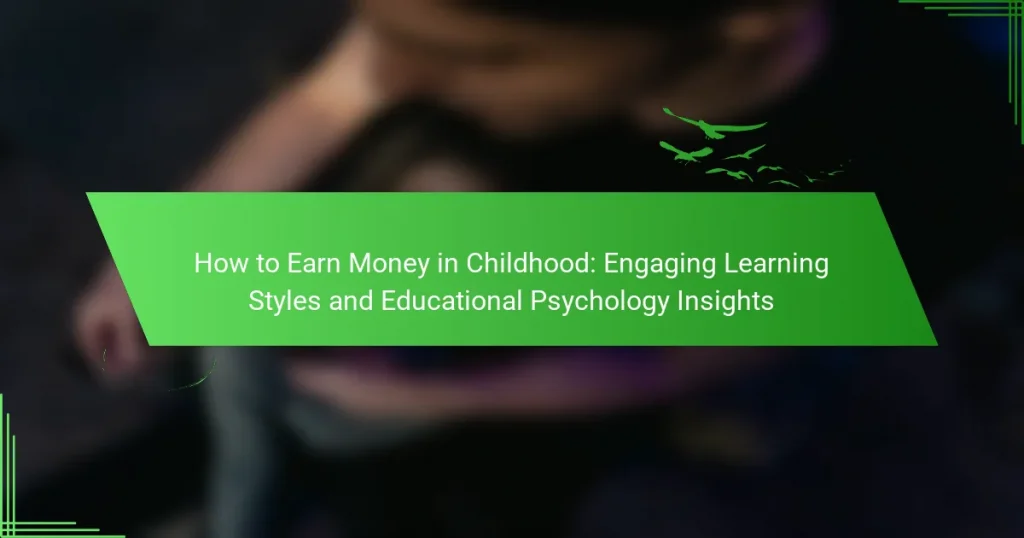Earning money in childhood can enhance creativity, responsibility, and financial literacy. Engaging learning styles foster practical skills and problem-solving abilities. Children can leverage their talents through services, crafts, and community projects. Parents and educators play a crucial role in creating supportive environments that encourage exploration and financial understanding.

How can engaging learning styles enhance childhood earning opportunities?
Engaging learning styles can significantly enhance childhood earning opportunities by fostering creativity and practical skills. Children who learn through interactive and hands-on methods often develop better problem-solving abilities. For instance, children engaged in project-based learning can create products or services, potentially generating income. Research indicates that children who utilize varied learning styles tend to retain information better, leading to improved performance in entrepreneurial activities. This adaptability can create unique opportunities for earning, such as starting small businesses or engaging in community projects.
What are the primary learning styles relevant to children?
Children primarily learn through visual, auditory, and kinesthetic styles. Visual learners benefit from graphs and charts, auditory learners excel with discussions and lectures, while kinesthetic learners thrive through hands-on activities. Understanding these styles enhances educational strategies and engagement. For instance, integrating visual aids can significantly improve retention for visual learners.
How does educational psychology inform earning strategies for children?
Educational psychology informs earning strategies for children by tailoring approaches to their learning styles. Understanding whether a child learns best through visual, auditory, or kinesthetic methods allows for the creation of engaging, effective earning activities. For instance, visual learners may benefit from interactive projects, while auditory learners thrive in discussion-based tasks. This alignment enhances motivation and retention, leading to better financial literacy and entrepreneurial skills. Additionally, fostering a growth mindset through educational psychology encourages resilience, helping children navigate challenges in their earning pursuits.

What universal attributes support earning money in childhood?
Earning money in childhood is supported by attributes like creativity, responsibility, and financial literacy. Engaging in activities that foster these skills enhances opportunities for income generation. For example, creative ventures such as arts and crafts can lead to sales, while learning to manage earnings builds financial awareness.
What are the benefits of early financial literacy?
Early financial literacy provides children with essential skills for managing money, fostering independence and confidence. It enhances decision-making abilities, allowing them to distinguish between needs and wants. Engaging with finances early can lead to better saving habits, as children learn the importance of budgeting and delayed gratification. Studies show that individuals with early financial education are more likely to achieve financial stability in adulthood. This foundational knowledge can significantly impact their future financial success, making it a unique attribute of early learning.
How do practical skills contribute to earning potential?
Practical skills significantly enhance earning potential by making individuals more marketable. Engaging in hands-on activities fosters competencies that employers value, such as problem-solving and collaboration. Studies show that children who develop practical skills early on are more likely to secure higher-paying jobs later. For instance, learning coding or woodworking can lead to lucrative opportunities in technology and craftsmanship. By focusing on practical skills, children can build a foundation for financial success in their future careers.
What role does parental support play in childhood earnings?
Parental support significantly enhances childhood earnings by fostering skills and motivation. Research shows that children with supportive parents tend to pursue educational opportunities, leading to higher income potential. Involvement in their learning process cultivates resilience and a strong work ethic, crucial for future success. Furthermore, parental encouragement boosts self-esteem, which correlates with better performance in school and later careers.

What unique strategies can children use to earn money?
Children can use unique strategies such as leveraging their skills, creativity, and local opportunities to earn money. For instance, they can offer services like pet sitting, lawn mowing, or tutoring. Additionally, creating handmade crafts or digital content to sell online can be effective. Engaging in community events or markets allows children to showcase their talents and connect with potential customers. These approaches not only generate income but also foster entrepreneurial skills and financial literacy.
How can children leverage their hobbies for income?
Children can leverage their hobbies for income by monetizing their skills and interests. They can start small businesses, create online content, or offer services based on their hobbies. For instance, a child passionate about art can sell their artwork or offer lessons. Engaging in such activities not only generates income but also enhances their learning experiences. Research indicates that children who engage in entrepreneurial activities develop critical thinking and problem-solving skills, making this approach beneficial for their overall growth.
What entrepreneurial opportunities are suitable for children?
Children can engage in various entrepreneurial opportunities such as lemonade stands, pet sitting, crafting, tutoring, and online content creation. These activities foster creativity and responsibility while providing practical money-making skills. For example, a lemonade stand teaches basic business principles and customer service. Each opportunity allows children to learn about supply and demand, marketing, and financial management, making entrepreneurship accessible and educational.
How can children start a small business?
Children can start a small business by identifying their interests and skills, then developing a simple plan. Engaging projects like lemonade stands or crafts can provide practical experience. They should learn about budgeting and marketing to enhance their understanding. Setting achievable goals fosters motivation and responsibility.
What are effective ways to market a child-run service?
To market a child-run service effectively, leverage social media, local community events, and word-of-mouth. Engaging storytelling can attract attention and build trust. Utilize educational psychology insights to tailor marketing strategies that resonate with both children and parents. Highlight unique attributes such as creativity and responsibility that children demonstrate through their service.

What rare attributes can influence childhood earning potential?
Rare attributes influencing childhood earning potential include creativity, adaptability, and early exposure to financial literacy. Creativity fosters problem-solving and innovation, making children more marketable. Adaptability allows them to thrive in diverse environments, enhancing their employability. Early exposure to financial literacy equips them with essential skills for managing money, leading to better financial decision-making in adulthood. These attributes significantly impact long-term earning potential by shaping a child’s ability to navigate the workforce effectively.
How does resilience impact a child’s ability to earn money?
Resilience significantly enhances a child’s capacity to earn money by fostering adaptability and problem-solving skills. Children with high resilience are more likely to take initiative in entrepreneurial activities and overcome challenges. They develop a strong work ethic, enabling them to pursue various income-generating opportunities. Studies show that resilient children often demonstrate better social skills, which can lead to networking and collaboration advantages in earning potential. Furthermore, resilience helps children manage setbacks effectively, allowing them to learn from failures and persist in their efforts to achieve financial goals.
What innovative projects have children successfully executed for income?
Children have successfully executed innovative projects for income through various entrepreneurial ventures. Examples include creating crafts to sell, offering tutoring services, and launching online businesses. These projects not only provide financial benefits but also enhance skills such as creativity, responsibility, and time management. Engaging in such activities fosters a practical understanding of money management and entrepreneurship from a young age.

How can parents and educators foster effective earning environments?
Parents and educators can foster effective learning environments by promoting engagement, adaptability, and support. Engaging learning styles cater to diverse student needs, enhancing motivation. Incorporating educational psychology insights allows for tailored approaches that resonate with children’s cognitive and emotional development. Creating a safe space for exploration encourages risk-taking in learning, which is essential for skill acquisition and personal growth.
What practical steps can parents take to encourage money-making activities?
Parents can encourage money-making activities by fostering creativity and responsibility in their children. Start by introducing age-appropriate tasks that align with their interests. For example, children can sell homemade crafts or offer services like pet walking. Set clear expectations and provide guidance on managing earnings. Encourage them to save a portion of their income to teach financial responsibility. Additionally, involve them in discussions about budgeting and spending wisely. This practical approach not only promotes entrepreneurial skills but also instills valuable life lessons.
How can educators integrate earning opportunities into the curriculum?
Educators can integrate earning opportunities into the curriculum by incorporating practical projects that teach financial literacy. This approach enhances engagement through hands-on learning experiences.
1. Implement project-based learning where students create products or services to sell.
2. Introduce financial literacy modules that cover budgeting, saving, and investing.
3. Organize competitions that reward entrepreneurial ideas, fostering innovation.
4. Partner with local businesses for internships or mentorship programs, providing real-world insights.
These strategies not only teach essential skills but also motivate students by demonstrating the value of earning money from a young age.

What are the common mistakes to avoid when guiding children in earning money?
To effectively guide children in earning money, avoid common mistakes that hinder their learning and growth.
First, do not impose adult-like expectations on children. They need guidance that matches their developmental stage. Second, avoid neglecting the importance of teaching financial literacy. Children must understand the value of money and budgeting. Third, refrain from discouraging creativity. Allow children to explore various ways to earn money, such as through crafts or services. Lastly, do not overlook the significance of setting realistic goals. Help children establish achievable targets to build confidence and motivation.
How can parents ensure a balanced approach to childhood work?
Parents can ensure a balanced approach to childhood work by integrating engaging learning styles with educational psychology insights. Encourage children to explore various activities that align with their interests and strengths, fostering intrinsic motivation. Establish a routine that balances work and play, allowing for creativity and exploration. Monitor progress and provide constructive feedback to reinforce learning without overwhelming them. Lastly, involve children in setting goals to promote a sense of ownership in their work.
What are the best practices for supporting children’s financial independence?
To support children’s financial independence, engage them through practical experiences and educational methods. Encourage age-appropriate tasks like budgeting, saving, and earning through chores or small jobs.
Introduce concepts through games or simulations that reflect real-life financial scenarios. This hands-on approach enhances understanding and retention.
Promote discussions about money management to develop critical thinking skills. Use real-world examples to illustrate the impact of financial decisions.
Foster a mindset of entrepreneurship by encouraging creativity and problem-solving. This empowers children to explore various avenues for earning money.
How can children learn from their earning experiences for future success?
Children can learn from their earning experiences by developing critical skills for future success. Engaging in money-earning activities fosters responsibility, decision-making, and financial literacy. For example, children who earn money through chores or small businesses grasp the value of hard work and budgeting. This hands-on experience enhances their understanding of money management, preparing them for adult financial responsibilities. Educational psychology supports this approach, emphasizing experiential learning as a key method for retention and application of knowledge. As a result, these early earning experiences can significantly influence their future financial behaviors and career choices.




